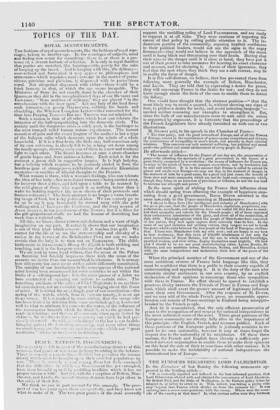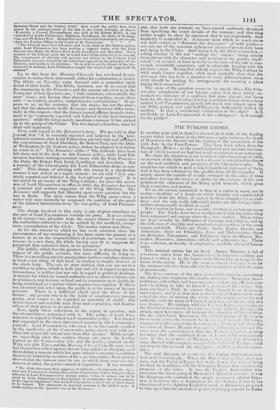E RUMOURS REGARDING LORD PALMERSTON.
IN the Esominer of last Sunday the following statements ap- peared in the leading article— "It is currently reported and believed in the best-informed quarters, that Lord Pal nerston advised with and obtained the concurrence of Lord Aberdeen, Sir Robert Peel, and the Duke of Wellington, hi the Eastern policy before Ile adopted it, or before he acted on it. This, indeed, was taking a pretty wide step beyond that Taurus which divides us from the common foe.' It wax entering into a secret correspondence with the enemy. Where were the coon' cila of the country at that time? In what curious milieu were they betweca Downing Street and the Carlton Club? How would the public have been struck by the announcement of the fact in the Court Circular, as thm-... Yesterday a Council Extraordinary was held at Sir Robert Peel's : it was 'attended by Lords Palmerston, Aberdeen, Lyndhurst, the Duke of Wdling-
' ton, and Sir Robert Peel. Despatches were forwarded immediately afterwards, 'from the Foreign 011ice, to the Court of St. Petersburg.' * * * The Liberals have been left alone and in the dark on this Eastern policy, whik Lord Palmerston hos been making a separate treaty with the Four Powers—the Duke, Sir Robert Peel, Lords Lyndhurst and Aberdeen. Not a member of the Liberal party did or would Lord Palmerston deim to consult. The compliment of advising with persons not sitting in the Cabinet, Lord Pahnerston reserves exclusively for individuals opposed to the principles of the Ministry, and hostile to its existence. To be able to set the friends of the Go- vernment at defiance, Lord Palmerston sought the counsel and support of its enemies."
Up to this hour the 314rning Chronicle has not found it con- venient to notice these statements, either for confirmation or denial.
The Globe, on Tuesdey, came forward with a somewhat tartly denial of their truth. The Globe, however, saw fit to assert that the statements in the Examiner, and the rumour IRIVETted to in the Postscript of last Spectator,arc," with variations, substantially the
same" story ; and having thus classed them together, meets them with " an explicit, positive, comprehensive contradiction." It ap- pears to us, on the contrary, that the stories are not the same ;
and that the statements in the Examiner and Spectator differ mate- rially in this respect—that the former journal affirms its main state-
ment to be " currently reported and believed in the best-informed quarters," while the latter merely mentions a rumour it has picked up tis the gossip of the Clubs. The two reports,theretbre, must be dealt with separately.
First, with regard to the Examiner's story. We are told in that journal, that " it is currently reported and believed in the best-
informed quarters, that Lord Palmerston advised with and obtained the concurrence of Lord Aberdeen, Sir Robert Peel, and the Duke of Wellington, in the Eastern policy, before he adopted it or before
he acted on it." The Examiner adds—" The Liberals have been left alone and in the dark on this Eastern policy, while Lord Pal- merston has been making a separate treaty with the Four Powers— the Duke, Sir Robert Peel, Lords Lyndhurst and Merdeen. Not a member of the Liberal party did Lord Palmerston deign to con- sult." This charge of advising with the enemy in a clandestine manner is not stated as a vague rumour: we are told " it is cur- rently reported and believed in the best-informed quarters." It is not stated by an enemy of the Whig Cabinet ; for since the acces- sion of Lord MELBOURNE to office in 1835, the Examiner has been a constant and zealous supporter of the Whig annistry. The Examiner still supports that Ministry upon every question but the war in Syria. The story comes from the 'Whig camp—from a writer who may naturally be supposed the confidant of the griefs of the Liberal dissentients front the war-policy of Lord Pareeen- STON.
The charge involved in this story is one of gross treachery on the part of Lord PALMERSTON towards his party. It is too serious in its nature—too plausible from the source whence it comes and the authorities referred to—to be settled by the unofficial, anony- mous contradiction of the Globe. The matter cannot rest there.
As for the rumour to which we last week adverted, since the circumstance of our mentioning it has been made the ground of a lecture at us on the responsibilities of journalism, we restate our reasons in a new form, the Globe having seen fit to suppress the paragraph that embodied them, in its quotation.* The public, which has the greatest interest in detecting the in- trigues of time public servants, has most difficulty in doing so. There is a trembling anxiety among place-holdels and place-hunters to hush every thing of that kind, as tending to inspire distrust of the whole body. The rule to state nothing that you are not in a condition to prove, which is both just and safe in regard to private transactions, is neither just nor safe in regard to political dealings. A rumour for which no named authority and no direct evidence can be produced, may become so loud and so consistent as to justify its being mentioned as a matter which requires investigation. If this is not admitted and acted upon, the public is at the mercy of' its own
servants. There is a sufficient check upon time abuse of the licence: any person who is in the habit of retailing every passing gossip, soon comes to be regarded as unworthy of credit : this deters honest and sensible men from such a practice, and disarms others or their power to do mischief
Now, apply these reflections to time report in question. and the circumstances connected with it. The imlicy et Lord PAL- minterox in regard to Turkey is a Conservative is hey. It is lauded and supported in the most unreserved manner by time Conservative journals. Lord PasstraisTox, who used to be incessantly assailed by the small wits of the Conservative party, meets now with ism. thing but respectful encomiums from that quarter. While people Fe marvelling what this sudden change can mean, the leading Journal on the Conservative side and the leading journal on the Whig side (the Times and the Jib ruing (hr,nicl,•) in the same week feel themselves called upon to devote long articles to the purrse of discrediting a rumour which has gone abroad respecting a coalition shout to be formell by members of the 0,,posing parties. Such an 8110 wed that the rumour must be one to which, from some circum- stances or other, the parties attached importance. It was remark- * The Giobe does more than suppress—it fahrientes : it represents the spe- ineor and Erg/Miler as stating that certain Conservative leaders had 6% en their adhesion to Lord PALMERSTON'S tbreign Ito, in return. 'toe to be laded hy Lord Palmerston iii t heir designs it overt timing the I ;over:mem, on the express stipulation" that Lord PALMERSTON is to be one of t he Cabinet to be hunted. The statement in inverted commas is the Giotre's own: it occurs neither in the y1,c1,r not in time Era Miitre. able that both the journals we have named cautiously abstained from specifying the exact details of the rumour ; and that they rather sought to show by argument that it was improbable, than implicitly to contradict it. A rumour upon which so much stress was laid—which so " fluttered the dovecotes" of both parties— was not one of the common ephemeral pieces of gossip daily born and dying in the Clubs. And trying it by the Giehe's own test,— asking whether it did not " outrage the unities,' being utterly inconsistent with the character and position of the parties impli- cated,"—it seemed, at least in so fir as the hero of time tale is con- cerned, beautifully consistent, and in admirable keeping with his previous career. Seeing that nobody expects the Whig Cabinet to stick much longer together, what more probable than that the statesnuni who has been a member of every Administration since 1812 should be making his arrangements for securing a place among their successors?
The state of the question seems to be nearly this—The Con- servative complexion of our foreign policy had been widely re- marked on ; rumours of a coalition had gone abroad; but these have for the time died away, leaving a pointed charse of treachery against Lord PALMERSTON, gravely advanced and argued upon by one Whig journal, and. only half-flippantly, half-angrily denied by another. Is that a satisfactory termination of the atlidr? Is it creditable to Lord PALMERSTON or his colleagues ? 16 it enough for the public ?



























 Previous page
Previous page